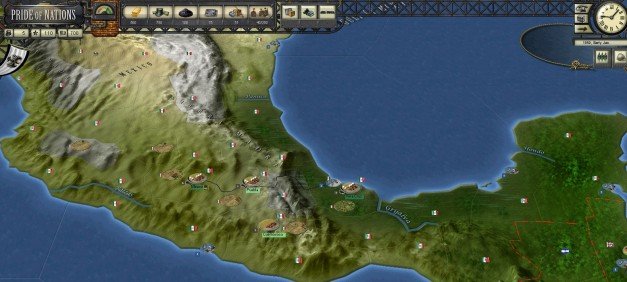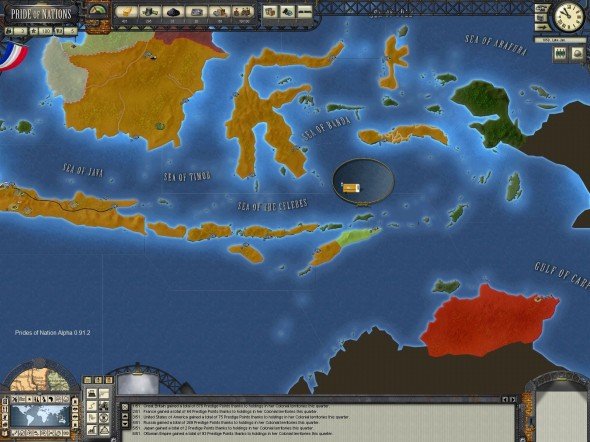Pride of Nations Preview

It's telling that each of the sessions here at the Paradox Convention is meant to last 30 minutes, but the presentation of Pride of Nations lasts an hour. It's a staggering game, epic in scale and minute in detail.
PoN is a simultaneous turn-based strategy game originally designed for simulation of conflicts for previous Paradox games like Rise of Prussia. Their ambition with their new game is to move to a much wider simulation. They still have the military aspects, but also economy, diplomacy, social, and more.
The game begins with the player taking control of a major power. In the example game we're being shown by the game's producer, Philippe Thibaut, he's taken control of England. Each campaign runs between 1850 and 1920, with each individual turn covering just two weeks. That makes a full game 1600 turns long, and even the developer admits he's never finished a game.
At this point in history, Victoria and Albie are the Royals, and Lord John Russell is the Prime Minister. You win the game by gaining a certain number of prestige points, by conquering different regions, building monopolies in trades, and leading your country through dynamic missions the game creates for you. For example, for the next ten years, Britain must be the world's number one producer of steel.

These missions are neat idea for providing players a focused metric for you success, especially in a game that's so complex. Even in the hour I sit with the game, it's hard to get a sense of what it's actually like to play. There are so many distinct parts to running your nation and trying to advance. Let's run through the areas I'm shown.
It's important for every nation to be working on discovering new regions. When you look at the map of Africa near the start, only afew small coastal regions are shown. The rest of the map looks like fudge because you haven't explored those areas yet. To discover these regions you send out expeditionary forces, but it becomes a race against rival countries trying to explore the same places. It's a land grab, where discovering and controlling a region first gives you greater number of actions to perform in those areas. If you're Britain and France reach Africa first, then they might colonise them and set up trade regions before you can get started.
Philippe explains that the military system is quite simple, but it's hard to believe him. The game has over 6000 historical leaders that can direct your troops. Clicking through the menus, you can get detailed breakdowns for the stats of every unit in your entire army. There are dozens of regiments currently under Britain's control in the game we're being shown.
The biggest gaming news, reviews and hardware deals
Keep up to date with the most important stories and the best deals, as picked by the PC Gamer team.
There's a research tree. You don't just put money in and get results back; instead, your money is spent to produce and propogate the inventions of scientists once they're made. If someone invents a new musket, you have to decide whether to give it to your armies, or wait another five or ten years till you reach the next invention and get that instead. There are two currencies too: state funds, and private capital. Your economy is driven by the latter, because in this era of history state money was used to pay armies, and not fund private businesses. Based on the type of population you have, it'll change which kind of money you get. In Britain, with its rich aristocracy, you have a lot of private capital. If you're playing as Russia, however, not so much.

